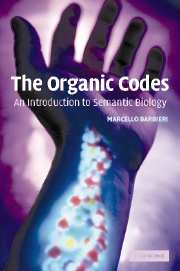Book contents
- Frontmatter
- Contents
- Foreword
- Dedication
- Acknowledgements
- Introduction
- Chapter 1 The microscope and the cell
- Chapter 2 Theories of evolution
- Chapter 3 A new model for biology
- Chapter 4 Organic codes and organic memories
- Chapter 5 The origin of life
- Chapter 6 Prokaryotes and eukaryotes
- Chapter 7 The Cambrian explosion
- Chapter 8 Semantic biology
- Chapter 9 A brief summary
- Appendix: Definitions of life
- Afterword
- References
- Index
Foreword
Published online by Cambridge University Press: 23 November 2009
- Frontmatter
- Contents
- Foreword
- Dedication
- Acknowledgements
- Introduction
- Chapter 1 The microscope and the cell
- Chapter 2 Theories of evolution
- Chapter 3 A new model for biology
- Chapter 4 Organic codes and organic memories
- Chapter 5 The origin of life
- Chapter 6 Prokaryotes and eukaryotes
- Chapter 7 The Cambrian explosion
- Chapter 8 Semantic biology
- Chapter 9 A brief summary
- Appendix: Definitions of life
- Afterword
- References
- Index
Summary
Most scientific publications deal with problems that can be explained in a straightforward manner and with solutions that can be evaluated as a matter of routine. But scientific progress often occurs when somebody tries to reformulate the problem, or to suggest a different kind of solution. When that happens, it may be necessary to dwell as much upon the questions as upon the answers, and to show how a novel approach might give further significant results.
Barbieri finds that biology has been able to deal with information and with structure, but not with the connection between them. Something has been left out, and that is meaning. Semantics is the branch of logic that deals with meaning: hence the term “semantic biology”. Meaning is a difficult concept to analyse, even though we find it in everything we read or listen to, including imaginative literature. To understand a poem one needs all sorts of background information. Poetry is rich in literary allusions, so just knowing the words will not do. Meaning is largely a matter of context, and that makes it hard to pin down.
The contextuality of meaning may be called a “principle”, for it is neither a brute fact nor a law of nature. But exactly what is meant by a principle is hard to specify. We can give some familiar examples of course. In ecology there is the well-known “competitive exclusion principle”, which explains why organisms occupying exactly the same niche cannot coexist for more than a brief period of time.
- Type
- Chapter
- Information
- The Organic CodesAn Introduction to Semantic Biology, pp. ix - xiiPublisher: Cambridge University PressPrint publication year: 2002
- 1
- Cited by



